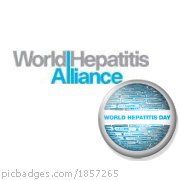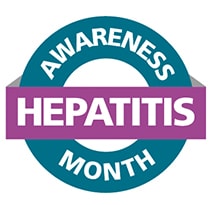 World Hepatitis Day is July 28th! What are you doing to raise awareness and educate others about hepatitis B? I asked this on HBF’s facebook page, and a friend from Ghana wondered what he could do to help raise awareness. Another friend replied about his concern with HBV in Malawi.
World Hepatitis Day is July 28th! What are you doing to raise awareness and educate others about hepatitis B? I asked this on HBF’s facebook page, and a friend from Ghana wondered what he could do to help raise awareness. Another friend replied about his concern with HBV in Malawi.
When you consider the scope of hepatitis B, globally, it is indeed sobering. Statistically, two billion people have been infected with hepatitis B worldwide, and 400 million are chronically infected. Don’t let these numbers discourage you from your efforts.
When I returned from China in 2003, my heart was heavy with the burden the Chinese people experience on a day-to-day basis, living with HBV. At the time I was providing infectious disease training for specific groups of Chinese people, but of course in the scheme of things, the outreach effort seemed minimal when compared to the burden. I had to focus my efforts one-person-at-a-time. I couldn’t let the sheer numbers discourage me from my mission to educate and raise HBV awareness at any level.
If you have the money or the connections to do something in a big way, that is wonderful. Then many will benefit from your contribution. However, I think it is important to note that hepatitis B education and awareness is fundamentally carried out at a grassroots level, where small numbers of individuals band together to make a difference. Organizations like the Hepatitis B Foundation are crucial due to their ability to reach out and impact larger numbers of people through research, outreach, education and increased HBV awareness. Utilize their website, social media channels and outreach to gain and share educational information, and help raise awareness.
So what can you do as an individual? First thing you need to do is get educated on viral hepatitis. There is much confusion among people about how HBV is transmitted. If you mention hepatitis B, someone will invariably say, “oh yes. My uncle got that from eating contaminated food!” Well, he did get NOT hepatitis B from food! Know the ABC’s of viral hepatitis, and eliminate these myths. Hepatitis B is not spread casually, or by sharing a meal, hugging or kissing someone with hep B. However, HBV is non-discriminating, and we are all vulnerable if we are not vaccinated.
Learn the facts about HBV. Know some of the statistics, and how it is transmitted. Know the difference between an acute infection vs. a chronic infection. Know that 90% of adults will clear an acute infection, while 90% of infants infected will surely live with hepB for life. Be sure safe injection and medical practices are followed in health care settings.
To raise awareness and eliminate confusion, you don’t have to know the details of surface antigens, antibodies or how to interpret blood test results. You can look that up on HBF’s website! This detailed info comes with time. Start with the hep B basics. If you are educated, you can educate others.
Learn about the HBV vaccination. Know that if you are in a high risk group, you should be screened before you are vaccinated. The vaccine doesn’t work if you already have hepB! If you are not infected, then get vaccinated. Let everyone know why vaccination is necessary. Encourage pregnant women to be screened for HBV. Ninety percent of mother-to-child transmission of HBV can be eliminated by ensuring an infant receives a birth dose of the hepatitis B vaccine, followed by the other two shots in the series. If HBIG is available to newborns of infected mothers, that is even better.
Many believe that hepatitis B will not affect them because they may not have symptoms. They do not realize HBV is a silent epidemic. They may not realize the importance of their non-complaining liver, and how HBV can destroy it over time.
If you or loved ones have HBV, be sure you are vaccinated for Hepatitis A. Take care of your liver and abstain from alcohol and tobacco use. Eat a healthy diet, and practice safe sex. Practice standard precautions. Use common sense!
Now for the outreach part… Depending on your hep B status, you might be reluctant to share your new found information with everyone. Start with your family, friends and household contacts. They may not understand the global significance of HBV. It’s okay to start small.
If you’re ready to increase your effort, then reach out to your church, and your community. Join with others and participate in local city or village health center and community awareness events. Join an HBV support group, and if you’re interested, create a language specific group for your country. Volunteer, speak out, and help educate the masses of people who are unaware that HBV is truly a silent epidemic.
Together we can make a difference!
 World Hepatitis Day is Thursday, July 28th! Join the World Hepatitis Alliance. The theme is “This is Hepatitis”, which is aimed at raising global awareness. Globally, two billion people have been infected with hepatitis B, (one out of three), and 400 million live with a chronic, lifelong infection. Although there are excellent treatments available, there is no cure for hepatitis B. However, there is a safe and effective HBV vaccine. If you are infected, be sure loved ones and household contacts are screened and vaccinated. If you are not infected or not vaccinated, get vaccinated and help eliminate the spread of this virus, worldwide.
World Hepatitis Day is Thursday, July 28th! Join the World Hepatitis Alliance. The theme is “This is Hepatitis”, which is aimed at raising global awareness. Globally, two billion people have been infected with hepatitis B, (one out of three), and 400 million live with a chronic, lifelong infection. Although there are excellent treatments available, there is no cure for hepatitis B. However, there is a safe and effective HBV vaccine. If you are infected, be sure loved ones and household contacts are screened and vaccinated. If you are not infected or not vaccinated, get vaccinated and help eliminate the spread of this virus, worldwide.









